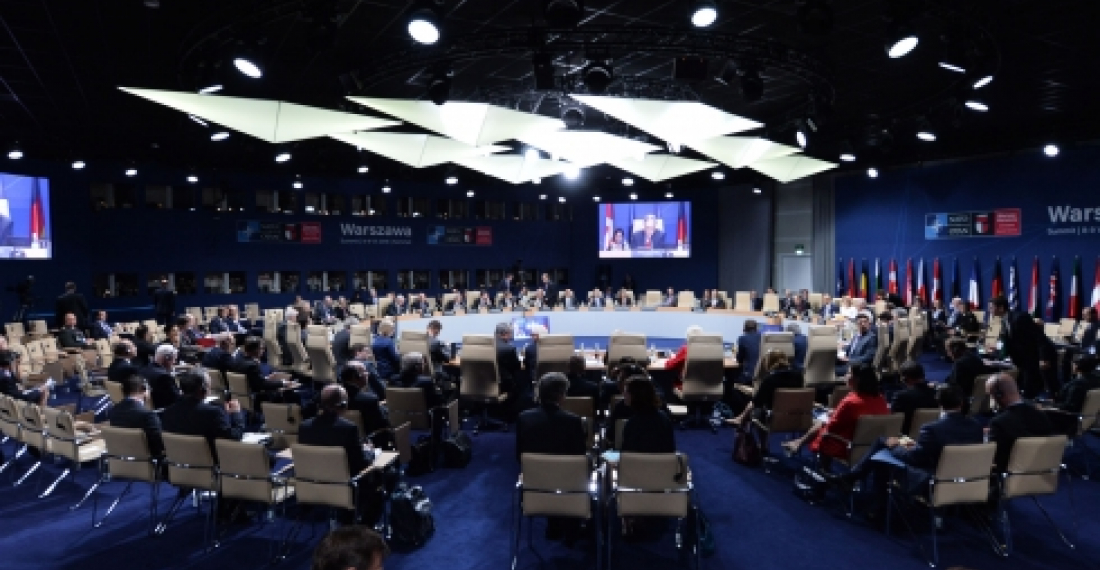In the framework of the summit of Heads of State and Government of the North Atlantic Treaty Organisation (NATO) joint declarations have been issued together with Georgia and with the European Union.
The joint declaration between NATO and Georgia came at the end of a special meeting of the Georgia-NATO Commission, the first ever to be held in the framework of a summit meeting. Earlier, Georgian Foreign Minister Janelidze reaffirmed Georgia’s determination to achieve NATO membership, which, he said, was a top foreign policy priority for Georgia, The joint declaration speaks of initiatives aimed "to strengthen Georgia’s defence and interoperability capabilities with the Alliance and are helping Georgia, an aspirant country, progress in its preparations towards membership".
The declaration states:
"We have also decided on new steps to intensify our cooperation, to help strengthen Georgia’s defence capabilities, interoperability and resilience capabilities. These initiatives include increased support for Georgia’s Training and Education, including through a possible trust fund project, and Strategic Communications. Allies will provide support to the development of Georgia’s air defence and air surveillance. Allies bilaterally are implementing programmes to enhance Georgia’s self-defence and resilience. We will also deepen our focus on security in the Black Sea region."
NATO Ministers commended the steady progress made by Georgia towards stronger democracy, economic development and more effective defence institutions and modernised armed forces. Allied Ministers encouraged Georgia to sustain the momentum in its overall reforms, which NATO will continue to support. NATO ministers looked forward to the October 2016 Parliamentary elections being conducted in accordance with the highest democratic standards.
You can read the full text of the Georgia-NATO Joint Statement here.
A joint declaration has also been issued by NATO and the European Union, in which they call for "new impetus and new substance to the NATO-EU strategic partnership". The declaration was signed by Donald Tusk, President of the European Council, Jean-Claude Juncker, President of the European Commission and Jens Stoltenberg, Secretary General of the North Atlantic Treaty Organization.
It says, "today, the Euro-Atlantic community is facing unprecedented challenges emanating from the South and East. Our citizens demand that we use all ways and means available to address these challenges so as to enhance their security".
The declaration adds:
"We are convinced that enhancing our neighbours' and partners' stability in accordance with our values, as enshrined in the UN Charter, contributes to our security and to sustainable peace and prosperity. So that our neighbours and partners are better able to address the numerous challenges they currently face, we will continue to support their sovereignty, territorial integrity and independence, as well as their reform efforts."
You can read the text of the EU - NATO Joint Declaration here
Commonspace.eu political editor said in a comment that "NATO's Warsaw summit has not only been an opportunity to strenghten the solidarity within the Atlantic Alliance, but also it has consolidated relations with strategic close partners. In their different ways Georgia and the European Union are special cases for NATO. Georgia seeks NATO membership and even before becoming a member it has already made significant contributions to the alliance. NATO is determined that Georgia's efforts be recognised and rewarded and the Joint Statement at the end of the Georgia-NATO Ministerial Commission sets out the way this will be done in a tangible manner. In a different way the relations between NATO and the EU are also unique. Most, but not all, EU member states are also members of NATO. It is important that NATO and the EU maintain close political positions especially in the face of Russian erratic relations in Eastern Europe. On the ground practical co-operation needs to be enhanced The declaration sets out concrete ways in which co-operation needs to take place, and adds that 'speedy implementation is essential". In the face of serious challenges the provisions of these statements and declarations need to be quickly turned into action. The summit has recognised the urgency, and all indications are that the alliance and its partners will respond in a timely and effective manner"
source: commonspace.eu with NATO Press Service and agencies.
photo: The meeting of the NATO-EU Ministerial Commission held on the margins of the Warsaw Summit, 8 July 2016 (picture courtesy of the NATO Press Service>)







